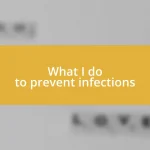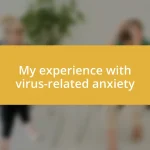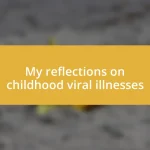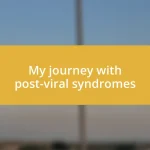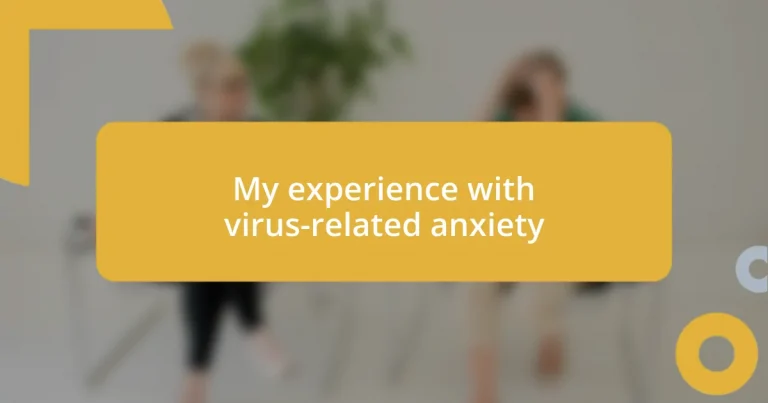Key takeaways:
- Recognizing and acknowledging virus-related anxiety is essential for coping; understanding that it is a common experience helps foster community support.
- Coping strategies such as establishing routines, grounding exercises, and mindfulness practices can provide relief from overwhelming anxiety and promote a sense of control.
- Seeking professional help is a crucial step in managing anxiety, offering new perspectives and practical tools that empower individuals to navigate their emotions effectively.
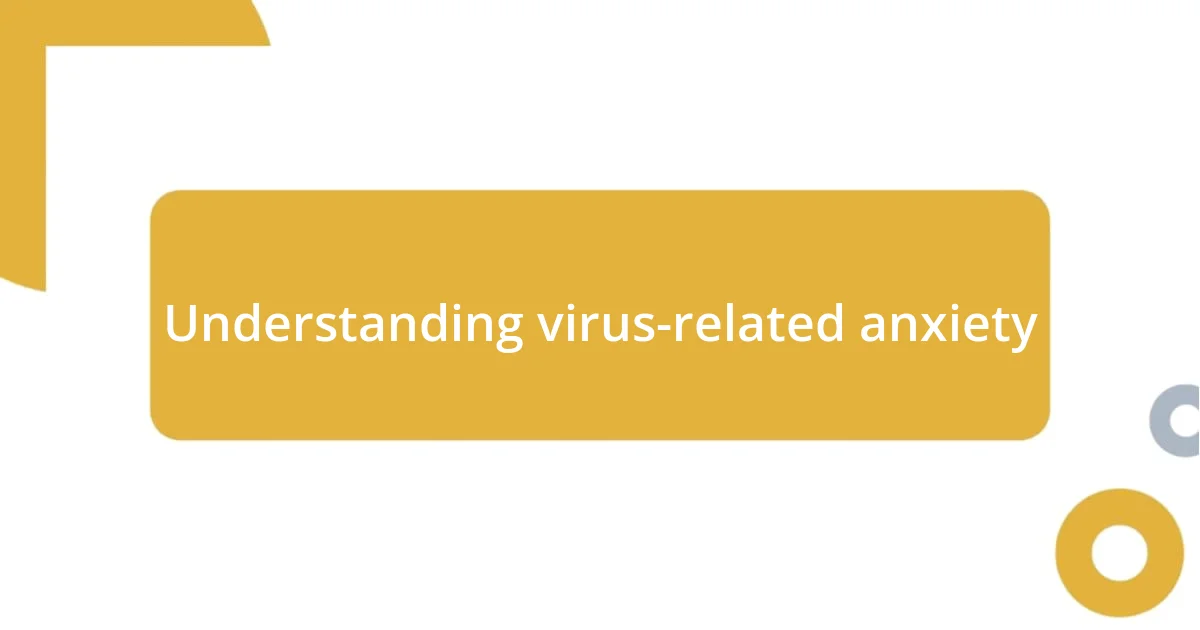
Understanding virus-related anxiety
Virus-related anxiety can be incredibly overwhelming, as it often stems from a fear of the unknown. I remember when the outbreak first began—I found myself obsessively checking the news every few hours. It felt like I was trapped in a spiral of constant worry. Do you ever find yourself lost in those thoughts?
During those early days, the thought of what could happen next haunted me. I found myself imagining the worst outcomes for myself and my loved ones. This type of anxiety isn’t just about the virus itself; it’s about the uncertainty and the changes it forces upon our lives. Have you noticed how difficult it can be to focus on anything else when anxiety takes hold?
I’ve learned that recognizing these feelings is crucial for coping. Understanding that my anxiety is a normal response to an extraordinary situation helped me find some peace. It’s okay to feel this way—it’s a collective experience we’re navigating together. Why do so many of us hesitate to talk about it? Opening up about these emotions can create a supportive dialogue that helps diminish the isolation we often feel.
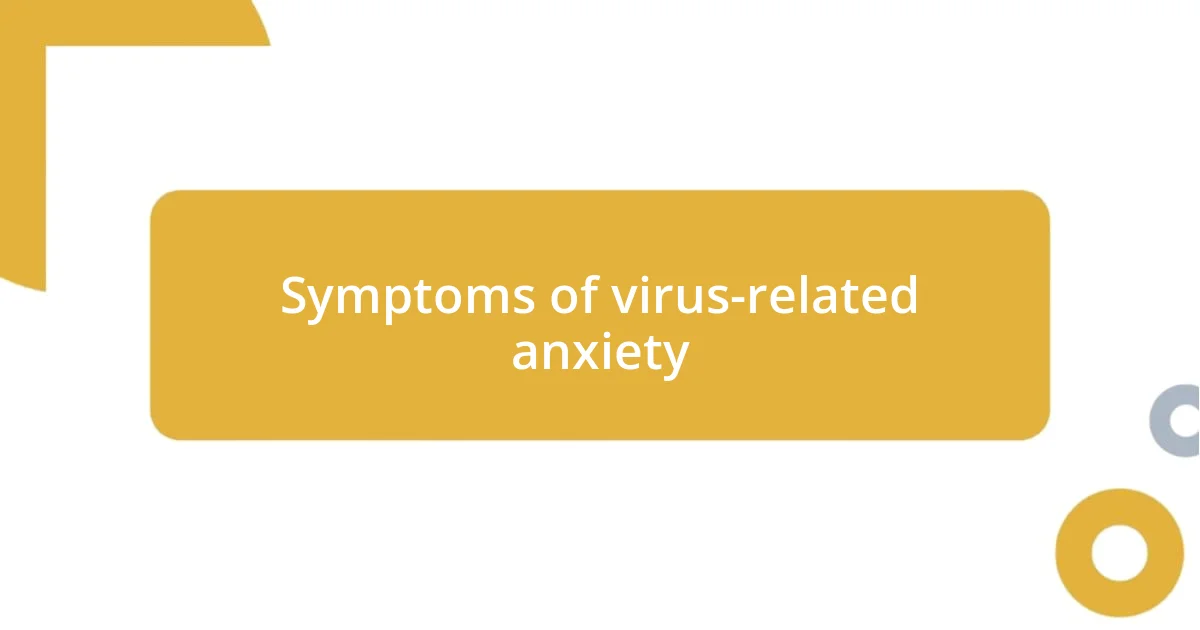
Symptoms of virus-related anxiety
Virus-related anxiety manifests in various ways, making it important to recognize the symptoms. For me, the constant state of alertness led to physical symptoms, like racing heartbeats and shallow breathing. I remember moments when I could barely sit still, feeling a tightness in my chest as if I was preparing for something dreadful. Have you ever felt like your body was on high alert, even without a clear threat in sight?
Alongside physical sensations, I also experienced cognitive symptoms. My mind would race with worries about health, safety, and the potential impacts of the virus. I’d find myself daydreaming about worst-case scenarios, which left me feeling drained and unfocused. It’s almost as if my mind was cluttered with unnecessary noise. Can you relate to these overwhelming thought patterns?
Emotional symptoms often followed closely, creating a cycle of distress that could feel unbreakable. I found myself grappling with feelings of sadness, irritability, and even anger over circumstances beyond my control. During these times, reaching out to friends and sharing these emotional burdens made a colossal difference. Have you discovered any coping mechanisms that help you navigate through these turbulent feelings?
| Symptoms | Description |
|---|---|
| Physical Symptoms | Increased heart rate, shallow breathing, tightness in the chest |
| Cognitive Symptoms | Racing thoughts, excessive worrying about health and safety |
| Emotional Symptoms | Feelings of sadness, irritability, and frustration |
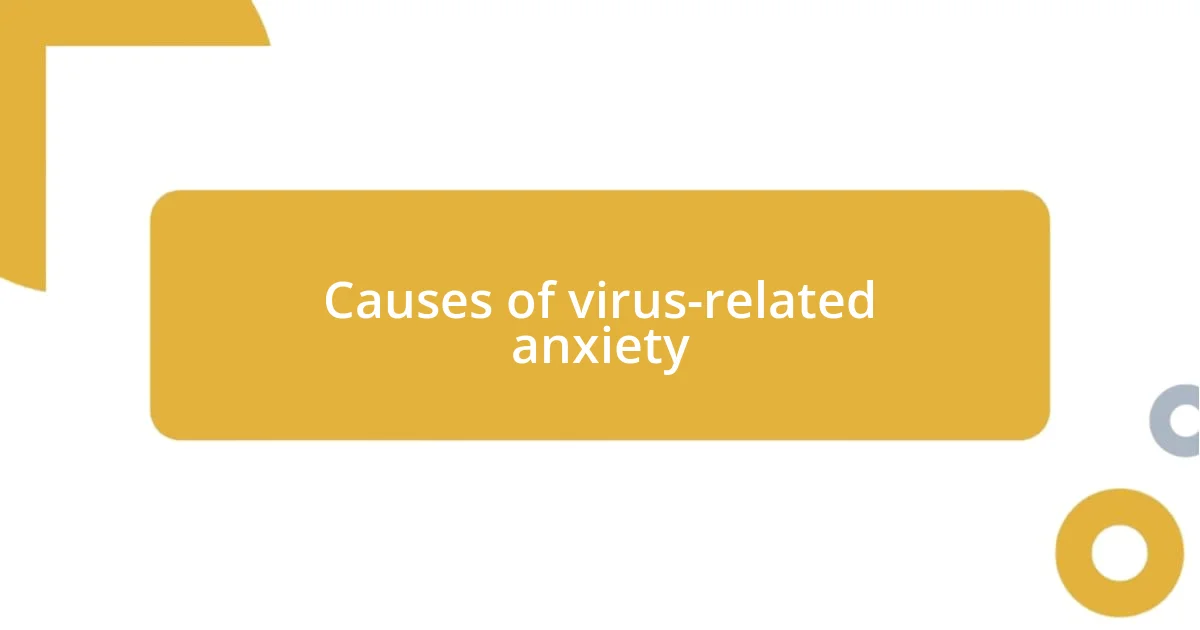
Causes of virus-related anxiety
As I explored the roots of my virus-related anxiety, it became evident that a few key factors played a significant role. One major cause was the relentless influx of information. I vividly recall scrolling through my social media feed, bombarded with headlines and opinions. Each post, whether alarming or reassuring, only seemed to heighten my anxiety instead of alleviating it. In an age where news travels faster than the virus itself, it’s hard to sift through what’s credible and what’s not.
Additionally, personal circumstances can exacerbate feelings of anxiety. I remember feeling particularly anxious when I thought about my loved ones, especially those with pre-existing health conditions. The fear of not knowing how the virus might affect our lives created a heavy weight on my chest. To put it simply, the anxiety often came from a mix of external information overload and deeply personal concerns.
Causes of Virus-Related Anxiety:
– Information Overload: Constant news updates and social media discussions can create a sense of panic.
– Fear for Loved Ones: Worrying about family members’ health and safety amplifies stress.
– Loss of Routine: Changes to daily life can lead to feelings of instability and uncertainty.
– Global Impact: Understanding that the crisis affects everyone can both connect and overwhelm, amplifying feelings of helplessness.
Navigating these triggers was a process—alongside understanding my emotions, finding ways to manage the noise became vital. Learning to step back from the screen and engage in calming activities helped me regain a sense of control. If you’ve experienced this, what strategies have worked for you in managing the information flood?
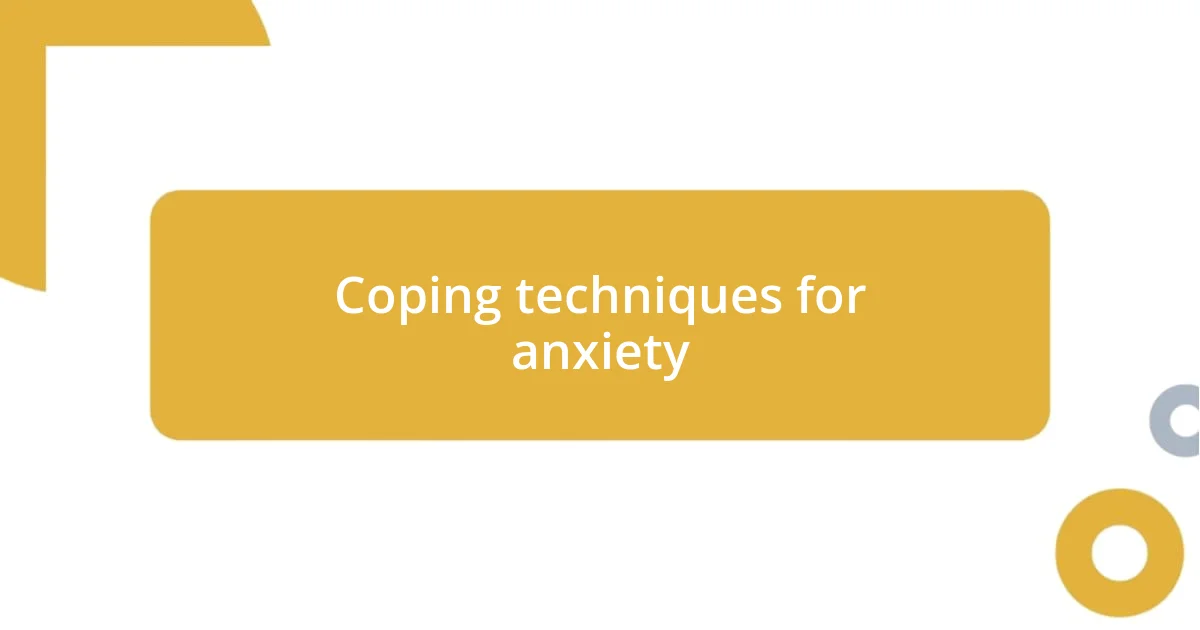
Coping techniques for anxiety
Finding effective coping techniques for anxiety is crucial for anyone grappling with the overwhelming feelings that come with uncertainty. One technique that worked wonders for me was establishing a daily routine. I discovered that starting my day with a structured plan, such as setting aside specific hours for work, exercise, and relaxation, helped anchor my mind. Isn’t it funny how something as simple as a schedule can instill a sense of stability amidst chaos?
Another strategy I found incredibly helpful is grounding exercises. In moments of heightened anxiety, I would focus on my surroundings—identifying five things I could see, four I could touch, three I could hear, two I could smell, and one I could taste. It’s amazing how this simple practice can pull you back to the present. I remember a particular afternoon when the news felt too heavy; these grounding exercises turned my focus away from my thoughts and back to the here and now. Have you ever tried something like that to bring yourself back to reality?
Finally, I can’t stress enough the power of connection. I often reached out to my friends for virtual coffee dates or simple check-in calls. Sharing my feelings and hearing their concerns created a comforting sense of community. A beloved friend once reminded me, “You’re not alone in this.” Those words resonated deeply, and I realized that sometimes, expressing vulnerability can lead to profound support. Have you found solace in talking to loved ones during tough times?
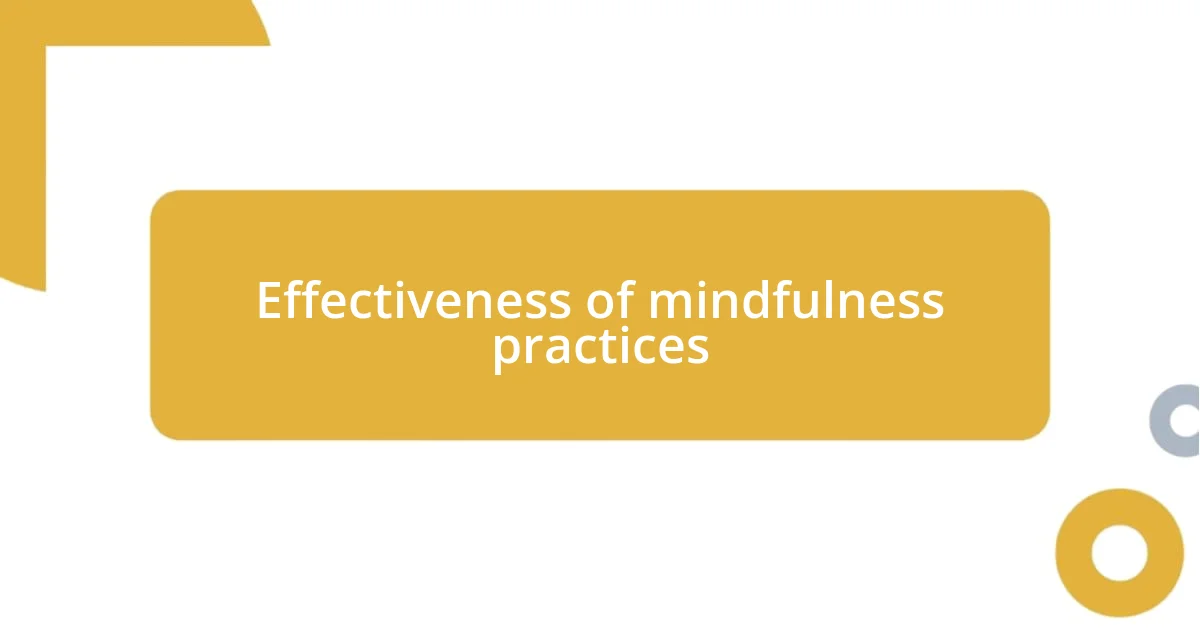
Effectiveness of mindfulness practices
Mindfulness practices played a pivotal role in easing the grip of my virus-related anxiety. I still remember my first introduction to meditation; it felt so foreign at first, sitting in silence while my mind raced with worries. However, over time, I began to cherish those moments of stillness, realizing that simply observing my breath helped to quiet the storm of thoughts swirling in my head. Isn’t it remarkable how dedicating even just a few minutes to mindfulness can create such a profound shift in perspective?
Incorporating mindfulness techniques like deep breathing or visualizations transformed my daily routine. On particularly stressful days, I would find a quiet corner, close my eyes, and visualize a peaceful place—like a serene forest or a tranquil beach. The crisp air or gentle waves would wash over me, providing a temporary escape from the overwhelming noise of the outside world. Have you ever tried this kind of mental imagery? It felt like pressing a reset button on my anxiety, allowing me to emerge with a clearer mind and a calmer heart.
Moreover, practicing mindfulness isn’t just about isolated moments; it can be woven into our everyday activities. A simple practice I adopted was mindful eating. I took the time to savor each bite of my meals, noticing flavors and textures, which made me appreciate nourishing myself beyond the mere act of eating. This connection to my food not only grounded me but also encouraged a deeper awareness of my body and its needs. Can you recall a moment where slowing down changed your perspective? This kind of awareness made me feel more in control amidst the chaos, reminding me that even during turbulent times, small joys can be powerful.
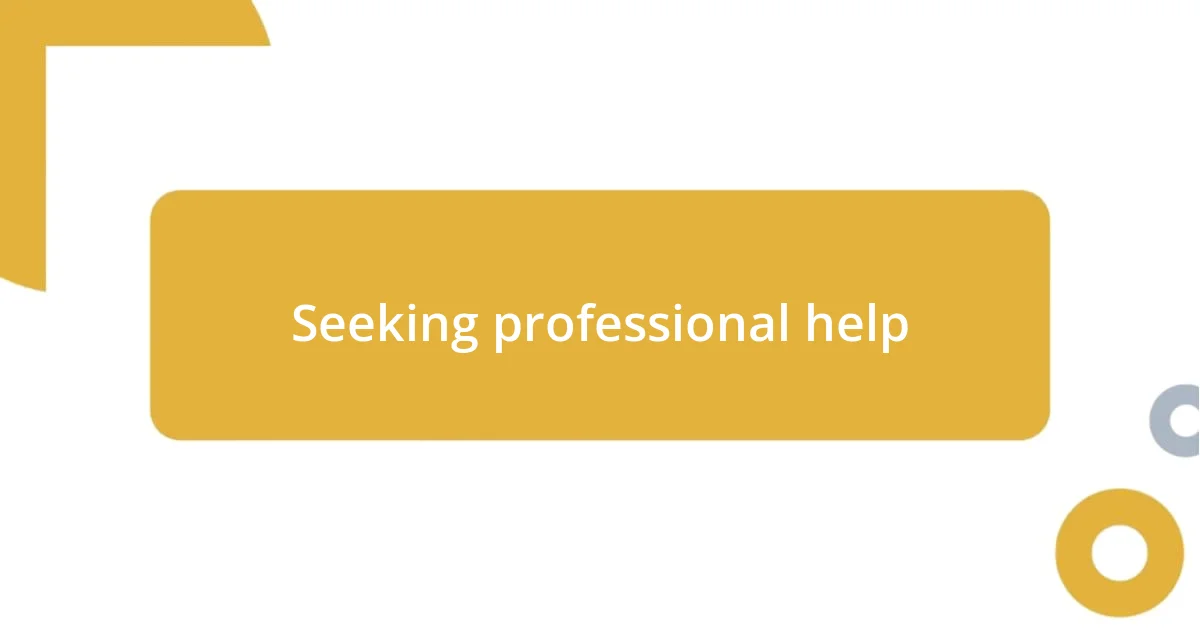
Seeking professional help
When I first reached out for professional help, it felt like a significant step, almost a leap into the unknown. But that first call to a therapist turned out to be a moment of clarity. I remember sitting on my couch, heart racing as I dialed the number, and thinking: “This is me choosing to prioritize my mental health.” It wasn’t just about finding someone to talk to; it was about recognizing that I needed guidance on how to navigate my anxiety effectively.
Every session offered me a new perspective, revealing the layers of my feelings that I hadn’t fully acknowledged. I fondly recall a particular session where my therapist mentioned that being anxious doesn’t mean I’m weak—it’s a human response to uncertainty. That insight struck a chord with me, transforming my self-judgment into a sense of compassion. Isn’t it interesting how a professional can illuminate things we often overlook in ourselves?
Moreover, I found that seeking professional help wasn’t merely about discussing my feelings; it also provided me with practical tools to manage them. For example, my therapist introduced me to cognitive behavioral techniques to challenge my anxious thoughts, which, at first, seemed daunting. Yet, as I practiced them, I started to see progress. Have you ever felt that exhilaration when you conquer a challenge? It was empowering to shift my mindset, and I realized that asking for help could be a powerful catalyst for change.
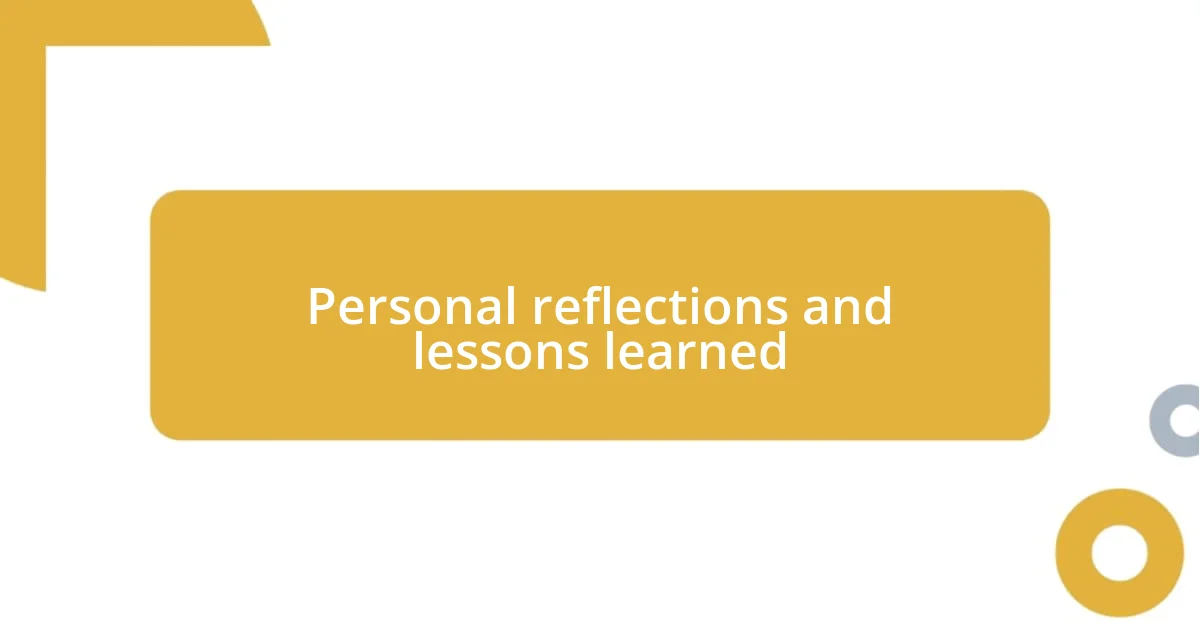
Personal reflections and lessons learned
Reflecting on my journey through virus-related anxiety, I can clearly identify the tipping points that reshaped my perspective. One day, while journaling my thoughts, I realized how often I resorted to “what-if” scenarios that spiraled into overwhelming fear. Have you ever had a moment where you stumbled upon a pattern in your thinking? That revelation prompted me to approach my worries differently, challenging those automatic thoughts rather than letting them dictate my emotions.
Every time I confronted my anxiety, I felt a growing sense of resilience. There was a particularly scary moment when I experienced a surge of panic, resembling the suffocation I felt during the early days of lockdown. I took a step back and reminded myself, “This too shall pass.” It was a simple mantra, but it sparked a powerful shift in how I managed those intense moments. Isn’t it amazing how a few words can serve as an anchor in turbulent waters?
Additionally, I’ve learned the importance of community in this process. Early on, I hesitated to share my struggles, fearing judgment or misunderstanding. However, I gradually opened up to close friends, and I was surprised by their willingness to listen and share their own experiences. Have you discovered that vulnerability connects us in unexpected ways? Those conversations helped me feel less isolated and reinforced the lesson that we’re all navigating our challenges together. The sense of belonging that emerged from those dialogues was truly transformative.







